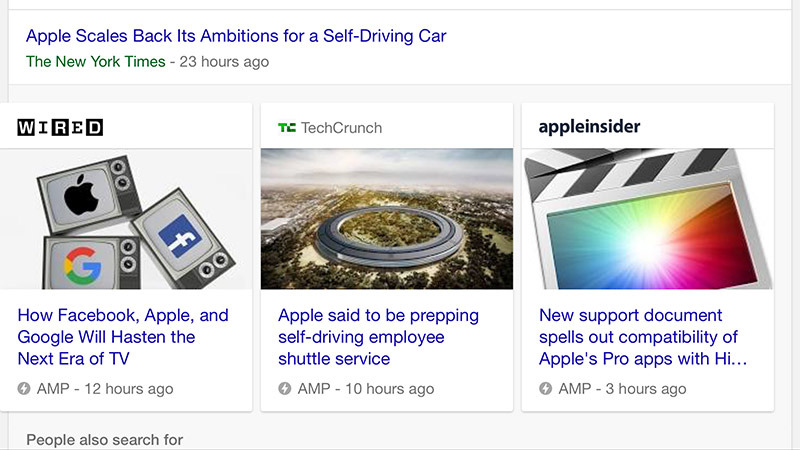When iOS 11 launches this fall, users sharing Google AMP pages from Safari will find Apple's operating system automatically remove Google's proprietary URL in favor of the webpage's original format.
The new feature, spotted by MacStories editor Federico Viticci, is present in the latest version of iOS 11 beta that was released on Monday.
Unveiled in 2015, Google AMP, or Accelerated Mobile Pages, is a custom-developed framework for rendering lightweight webpages designed for mobile consumption. Online media entities, including AppleInsider, offer support for AMP, allowing readers to quickly access stories through Google search.
Stripped down to text, rich graphics and video, AMP pages normally sport special links that in many cases do not relate to an originating article's URL. AppleInsider AMP pages do point to the original URL, but pages served up by other media outlets do not.
Currently, users who share AMP pages from iPhone and iPad are forced to share Google's non-standard URLs, which in turn leads recipients to the AMP page. This behavior will change in iOS 11.
"Very nice: when sharing AMP pages to iMessage or Reading List, iOS 11 Safari automatically removes AMP's crap from the URL. Go Apple," Viticci said in a tweet on Wednesday.
As Viticci notes, Safari in iOS 11 reformats AMP's specialized links when sharing story URLs. The feature appears to go further than simply stripping out text, however, as Google obscures or does not include original URL in its AMP page URLs.
For example, the URL for The Verge referenced in Viticci's tweet begins with "www.theverge.com/platform/amp," which leads to the AMP page for that particular story. In another example, USA Today typically formats its AMP pages with "amp.usatoday.com," followed by a story identification number.
In both cases, Safari must perform a backend process to suss out the AMP page's originating URL, then deliver that information in text form for sharing.
Apple is slated to release iOS 11 this fall with a bevy of new features, user interface tweaks and performance enhancements.
 Mikey Campbell
Mikey Campbell








 Charles Martin
Charles Martin
 Christine McKee
Christine McKee
 Wesley Hilliard
Wesley Hilliard
 Malcolm Owen
Malcolm Owen
 Andrew Orr
Andrew Orr
 William Gallagher
William Gallagher
 Sponsored Content
Sponsored Content








30 Comments
Could this story be written in a more straightforward way? I still don't why I need to be concerned about any of this.
Probably a good thing. While AMP is certainly one way to speed up a sometimes ridiculously slow-loading mobile web it may not be the BEST way. Simply downranking sites with bloated pages would have accomplished a lot of it without resorting to the "open-source" (wink-wink) AMP.
So yeah, good on Google for recognizing the problem and offering a fix. Bad on Google for essentially mandating a fix.
Fuck Google
A good first step. It would be better if they give you the option to force loading of the actual page while in Safari (maybe this is coming). I despise AMP pages. More often than not I want the actual URL (for sharing) or to visit the actual site because I want to get additional information from that site.
So happy that this is happening. AMP pages were were the thing that made me switch my default search engine. I won't be returning to google but a good move anyway.